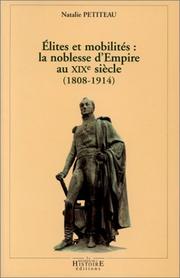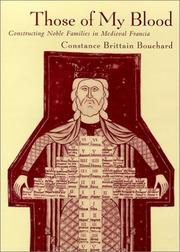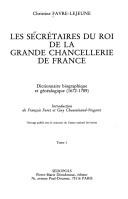| Listing 1 - 5 of 5 |
Sort by
|
Book
ISBN: 2235006949 9782235006941 Year: 1979 Publisher: Paris : Jules Tallandier,
Abstract | Keywords | Export | Availability | Bookmark
 Loading...
Loading...Choose an application
- Reference Manager
- EndNote
- RefWorks (Direct export to RefWorks)
Napoleon --- France --- Nobility --- Genealogy --- Noblesse --- Relations with admirals --- Genealogy. --- Nobility - France --- Nobility - France - Genealogy --- Napoleon - Relations with admirals --- Napoleon i (napoleon bonaparte), empereur des francais, 1769-1821 --- Histoire --- 1804-1814 (empire)

ISBN: 2910828107 9782910828103 Year: 1997 Publisher: Paris : La Boutique de l'histoire éditions,
Abstract | Keywords | Export | Availability | Bookmark
 Loading...
Loading...Choose an application
- Reference Manager
- EndNote
- RefWorks (Direct export to RefWorks)
Nobility --- Social registers --- Noblesse --- History --- Genealogy. --- Histoire --- Généalogies --- Napoleon --- Views on nobility. --- Genealogy --- Relations with admirals --- Relations with nobility. --- Généalogies --- Social registers - France - History - 19th century --- Nobility - France - History - 19th century --- Nobility - France - Genealogy --- Napoleon - Relations with admirals

ISBN: 2859444424 9782859444426 Year: 2001 Volume: 65 Publisher: Paris Publications de la Sorbonne,
Abstract | Keywords | Export | Availability | Bookmark
 Loading...
Loading...Choose an application
- Reference Manager
- EndNote
- RefWorks (Direct export to RefWorks)
France --- Kings and rulers --- Biography --- History --- Rois et souverains --- Biographies --- Histoire --- Biographie --- Royal houses --- Nobility --- 14th century --- 15th century --- Biography. --- Royal houses - France - Genealogy. --- Nobility - France - Genealogy. --- MOYEN AGE --- PROSOPOGRAPHIE --- ROIS ET SOUVERAINS --- ARISTOCRATIE --- FRANCE --- PARENTE --- REPERTOIRE --- GENEALOGIES --- NOBLESSE --- 14E-15E SIECLE

ISBN: 0812235908 9780812235906 9786613211484 1283211483 081220140X 0585436193 Year: 2001 Publisher: Philadelphia University of Pennsylvania Press
Abstract | Keywords | Export | Availability | Bookmark
 Loading...
Loading...Choose an application
- Reference Manager
- EndNote
- RefWorks (Direct export to RefWorks)
For those who ruled medieval society, the family was the crucial social unit, made up of those from whom property and authority were inherited and those to whom it passed. One's kin could be one's closest political and military allies or one's fiercest enemies. While the general term used to describe family members was consanguinei mei, "those of my blood," not all of those relations-parents, siblings, children, distant cousins, maternal relatives, paternal ancestors, and so on-counted as true family in any given time, place, or circumstance. In the early and high Middle Ages, the "family" was a very different group than it is in modern society, and the ways in which medieval men and women conceptualized and structured the family unit changed markedly over time. Focusing on the Frankish realm between the eighth and twelfth centuries, Constance Brittain Bouchard outlines the operative definitions of "family" in this period when there existed various and flexible ways by which individuals were or were not incorporated into the family group. Even in medieval patriarchal society, women of the aristocracy, who were considered outsiders by their husbands and their husbands' siblings and elders, were never completely marginalized and paradoxically represented the very essence of "family" to their male children. Bouchard also engages in the ongoing scholarly debate about the nobility around the year 1000, arguing that there was no clear point of transition from amorphous family units to agnatically structured kindred. Instead, she points out that great noble families always privileged the male line of descent, even if most did not establish father-son inheritance until the eleventh or twelfth century. Those of My Blood clarifies the complex meanings of medieval family structure and family consciousness and shows the many ways in which negotiations of power within the noble family can help explain early medieval politics.
Nobility --- Knights and knighthood --- History --- 929.7 --- Adel. Eretitels --- 929.7 Adel. Eretitels --- Knighthood --- Civilization, Medieval --- Chivalry --- Heraldry --- Orders of knighthood and chivalry --- Noble class --- Noble families --- Nobles (Social class) --- Peerage --- Upper class --- Aristocracy (Social class) --- Titles of honor and nobility --- Nobility - France - History - To 1500. --- Nobility - France - Genealogy. --- Knights and knighthood - France - History - To 1500. --- History. --- Medieval and Renaissance Studies.

ISBN: 2904177078 9782904177071 Year: 1986 Publisher: Paris SEDOPOLS
Abstract | Keywords | Export | Availability | Bookmark
 Loading...
Loading...Choose an application
- Reference Manager
- EndNote
- RefWorks (Direct export to RefWorks)
Nobility --- Genealogy --- Dictionaries --- French --- Biography --- France. Grande Chancellerie --- France --- Politics and government --- -Nobility --- -Noble class --- Noble families --- Nobles (Social class) --- Peerage --- Upper class --- Aristocracy (Social class) --- Titles of honor and nobility --- -Dictionaries --- -French --- -Biography --- -Politics and government --- Pʻŭrangsŭ --- Frankrig --- Francja --- Frant︠s︡ii︠a︡ --- Prantsusmaa --- Francia (Republic) --- Tsarfat --- Tsorfat --- Franḳraykh --- Frankreich --- Fa-kuo --- Faguo --- Франция --- French Republic --- République française --- Peurancih --- Frankryk --- Franse Republiek --- Francland --- Frencisc Cynewīse --- فرنسا --- Faransā --- Franza --- Republica Franzesa --- Gallia (Republic) --- Hyãsia --- Phransiya --- Fransa --- Fransa Respublikası --- Franse --- Францыя --- Frantsyi︠a︡ --- Французская Рэспубліка --- Frantsuzskai︠a︡ Rėspublika --- Parancis --- Pransya --- Franis --- Francuska --- Republika Francuska --- Bro-C'hall --- Френска република --- Frenska republika --- França --- República Francesa --- Pransiya --- Republikang Pranses --- Γαλλία --- Gallia --- Γαλλική Δημοκρατία --- Gallikē Dēmokratia --- فرانسه --- Farānsah --- צרפת --- רפובליקה הצרפתית --- Republiḳah ha-Tsarfatit --- פראנקרייך --- 法国 --- 法蘭西共和國 --- Falanxi Gongheguo --- フランス --- Furansu --- フランス共和国 --- Furansu Kyōwakoku --- Francija --- Ranska --- Frankrike --- Noble class --- Biography&delete& --- Dictionaries&delete& --- Genealogy&delete& --- France. --- French. --- Nobility - France - Genealogy - Dictionaries - French --- Nobility - France - Biography - Dictionaries - French --- France - Politics and government - 17th century --- France - Politics and government - 18th century
| Listing 1 - 5 of 5 |
Sort by
|

 Search
Search Feedback
Feedback About UniCat
About UniCat  Help
Help News
News